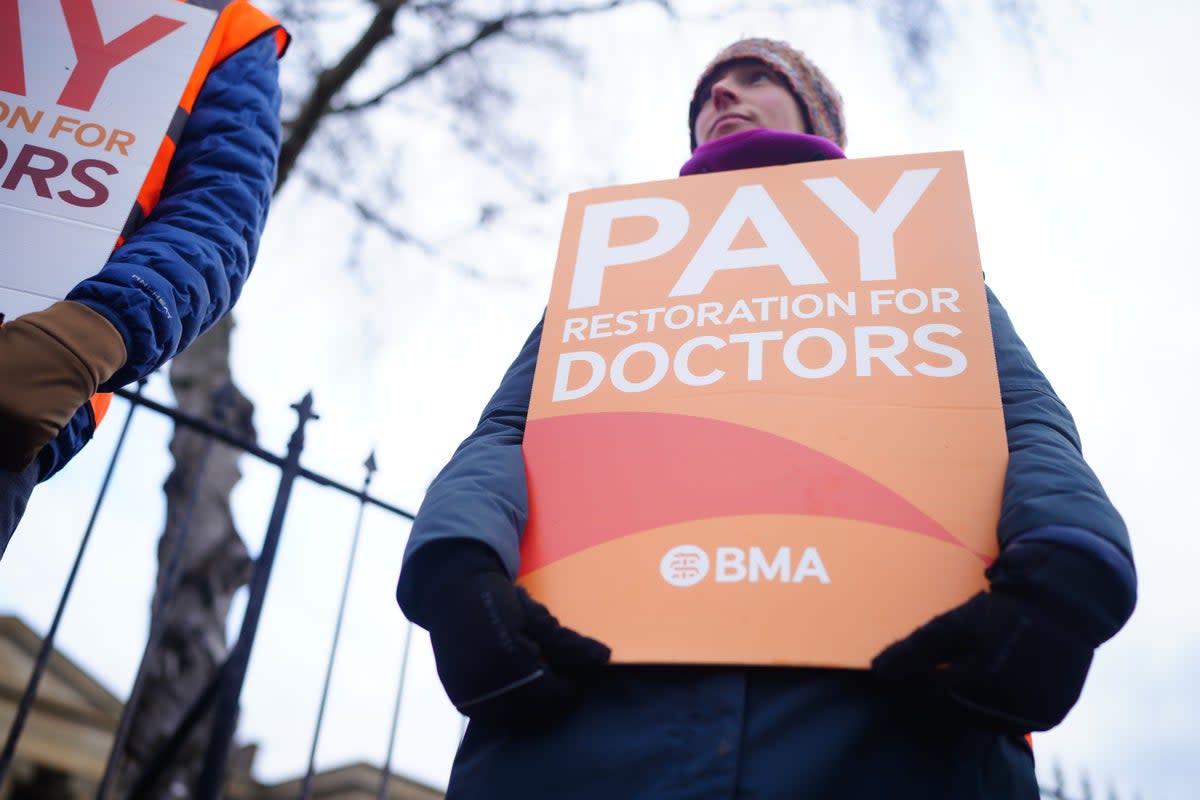Junior doctors vote to continue strike action for six more months, says BMA

Junior doctors in England have voted to continue taking industrial action for a further six months, the British Medical Association (BMA) has announced.
It urged the Health Secretary to make a new pay offer, after announcing that more than 97 per cent of members balloted had backed extending the action, amid a long-running dispute.
A total of 33,869 of junior doctors voted in favour on a turnout of 62 per cent, with the new mandate lasting until September 19. The ballot also approved the use of action short of strikes.
The chief of NHS Providers - a membership organisation for NHS health services - described the news as a “worrying escalation” which “will inevitably lead to more disruption to patient care”.
The BMA’s Junior Doctors Committee co-chairs Dr Robert Laurenson and Dr Vivek Trivedi said: “It has now been a year since we began strike action. That is a year of strikes too many.
“The Government believed it could ignore, delay, and offer excuses long enough that we would simply give up. That attitude has now led to the NHS wasting £3 billion covering the strikes.
“This is more than double the cost of settling our whole claim, and as we see in the results of today’s ballot, delaying tactics will not work. Doctors are still determined to see their pay cuts reversed, and they are willing to keep striking another six months to achieve that.
“The Government should see the urgency of the situation. Rather than waste time dragging out talks, they can come forward with a credible offer on pay right now.
“They don’t need to be in the same situation six months from now, with even more taxpayer money wasted. Instead they could be celebrating a revitalised and reinvigorated junior doctor workforce, one that feels that their value has started to be restored.
“That would be an achievement worth celebrating for everyone and begin to finally turn the tide on the deteriorating workforce crisis.
“No doctor wants to be on strike for a second longer than they have to, but it took us 15 years of declining pay to get here. Today’s re-ballot shows that doctors understand that reversing this means being in the struggle for the long haul.
“We ask the Health Secretary to come forward as soon as possible with a new offer – and make sure not a single further strike day need be called.”
Junior doctors have staged a series of walkouts over the past year as part of a campaign by the BMA for their pay to be restored after years of below-inflation increases.The deputy chief executive of NHS Providers, Saffron Cordery, said the announcement of extended strike action “marks another worrying escalation in this lengthy dispute” between the Government and junior doctors.
“The resounding backing for six more months of strike action as well as action short of strikes – which is just as hard to plan for and manage – will inevitably lead to more disruption to patient care,” she said.
“The knock-on effects for trusts will be also be major worry for trust leaders and their teams who have spent countless hours preparing for strikes, including cancelling and rescheduling appointments while doing everything they can to protect patient safety. This is time that could have been spent improving patient care and tackling sky-high waiting lists.
“With today’s results underlining the sheer strength of feeling among junior doctors, trust leaders are now facing anxious waits on three fronts with consultants voting on whether to accept their new deal, and specialist, associate specialist and specialty doctors being surveyed on their rejected deal.
“Alongside the nearly 1.5 million appointments delayed since industrial action began, strikes are expected to cost the NHS an estimated £3 billion. We cannot go on like this. Politicians and unions must urgently find a way to resolve all disputes for the sake of patients, staff and the NHS.”
News of the strike came as union Aslef announced on Wednesday a wave of train driver strikes that are set to cripple both the national railway network and London Underground during the Easter holidays.
A Department of Health and Social Care spokesperson said: “It is disappointing that BMA members have once again voted for industrial action, when we have already given junior doctors a pay rise of up to 10.3% this financial year and made clear in previous negotiations that further investment was available.
“Overall NHS waiting lists have decreased for four months in a row, but further strikes will impede this progress, and more than 1.4 million appointments and operations have now been rescheduled since industrial action began.
“We again urge the BMA Junior Doctors’ Committee to demonstrate they have reasonable expectations so we can come back to the negotiating table to find a fair deal that works for the NHS, doctors and patients.”


